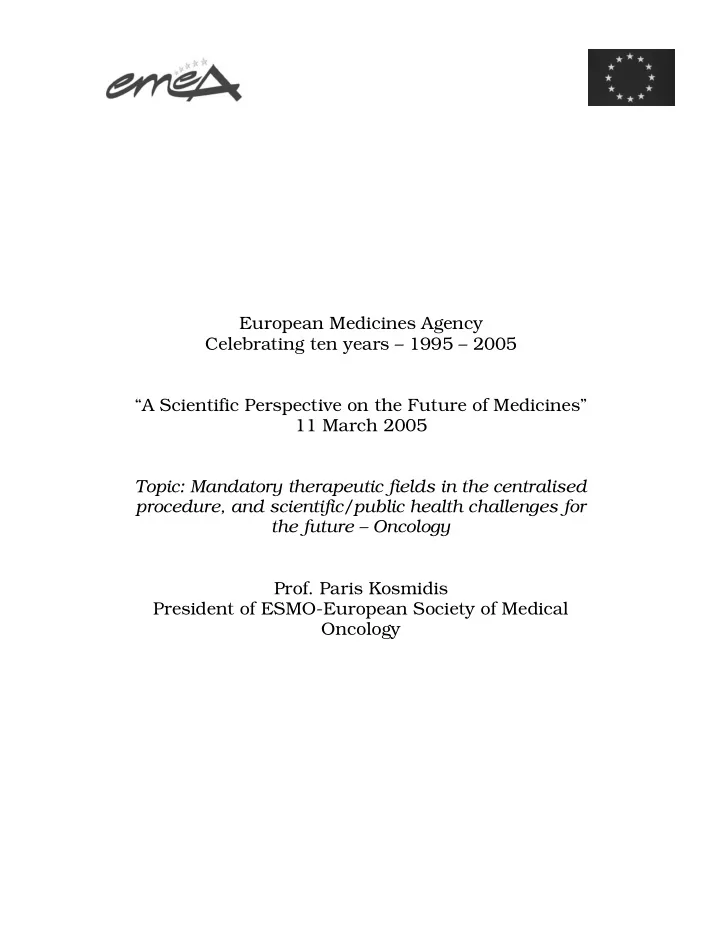

European Medicines Agency Celebrating ten years – 1995 – 2005 “A Scientific Perspective on the Future of Medicines” 11 March 2005 Topic: Mandatory therapeutic fields in the centralised procedure, and scientific/public health challenges for the future – Oncology Prof. Paris Kosmidis President of ESMO-European Society of Medical Oncology
EXPECTATIONS AND DEVELOPMENT IN THE TREATMENT OF CANCER PARIS A. KOSMIDIS MD ESMO PRESIDENT Cancer is the second most common cause of death in Europe. Ten million new cases of cancer are reported each year globally. Cancer is responsible for 12% of all deaths in the world. It is predicted that there will be a share increase in new cases with an estimated 15 million cases in 2020 due to aging population and lifestyle trends. The life expectancy of a European citizen is 78 – 79 years today in comparison to 71 years, 35 years ago. This is certainly related to the medical progress. Almost one third of new cancer cases can be effectively treated today given early detection and treatment. The 5-year survival of patients with cancer is 65% today whereas it was 50% 30 years ago. However, this survival is not equal among all European countries. For males, the 5-year survival is 48% in Austria and 25% in Poland. For females, the respective percentages are 58% in France and 40% in Poland. For young people the differences are even greater. For men, the 5-year survival is 78% in Austria and 38% in Estonia, whereas, for women, 82% in Switzerland and 56% in Estonia. It is evident that the survival of cancer patients is directly dependent on the gross domestic product (GDP) of each country. One of the major modes of treatment for cancer patients is the administration of drugs i.e. chemotherapy, hormones, targeted etc. Modern treatments are able to cure certain types of cancer, to prolong survival in others or to palliate the rest. However the cost of these medicines is getting higher. Research is becoming very expensive. In 20 years the cost of developing a drug has more than doubled. A new microelectronic component has increased ten – fold. The pharmaceutical industry has increased the investment in research and development to more than 30 billion euros
whereas the relative figures were below 3 billion euros 20 years ago. Medical science has achieved major breakthrough of human biology and oncogenesis. There is a better understanding of the function of genes and their products relevant to human cancer. Because of this progress, the molecular classification of cancer has been changed and targeted therapy has been developed against targets on cancer cells. Therefore, we are rapidly moving from a population based risk assessment to a predictive individualized approach of cancer care. This necessitates significant changes in the health policy of the governments. Changes in the hospital beds, outpatient services, home care, office visits etc. This is an important strategy, because with the newer smart drugs the cost will be decreased only by treating easier, without toxicity on a personal basis. In view on the new evidence on health care in cancer, organizations like the European Society of Medical Oncology (ESMO) and the European Medicinal Agency (EMEA) must co- operate very effectively in order to provide the right drugs to the right patients on the right time with the right price. ESMO is a leading oncology organization in Europe with a global influence. ESMO has 4.500 members representing 104 countries. It organizes congresses, conferences, consensus meetings, continuous medical education in oncology etc. It provides fellowship programs especially to young medical oncologists as well as publications of educational books. ESMO co-operates with other societies and Health authorities for a more effective co-ordination in the area of oncology care. ESMO has created a faculty of experts in different fields in oncology. In the recent past, ESMO and EMEA have co-operated in some activities and mainly in orphan medicinal products. This is a very important area because there are diseases although rare, however, treatable by medicinal products in which the consumption is small but absolutely important for several cancer patients. Typical is the example of gastrointestinal stromal tumors. ESMO is ready to provide expert’s opinion in all medicinal products for cancer under evaluation. ESMO is also ready to co-organize with EMEA educational sessions and open discussions involving academia, industry and health authorities about oncology issues. ESMO can also provide a forum to EMEA at our congresses and journals for communication. ESMO considers EMEA as a very important body of the European health care authorities and we are willing to contribute and cooperate to different cancer treatment activities.
Recommend
More recommend